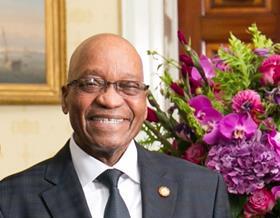
South Africans woke up this morning safe in the knowledge that the term of president Jacob Zuma has come to an end.
The South African currency, which had previously been strengthening from beyond R14 to the US Dollar to below R12 – purely on the rumours that this day would soon come – has strengthened even further.
Economist are now openly speculating that the economy will grow by more than 2 per cent this year after previously predicting hardly any growth.
Cyril Ramaposa, who was elected president of the governing party in December, will be inaugurated today (15 February) as the new South African president. He is expected to make changes in his cabinet during the next week which will are expected to boost optimism even further.
Most significantly, Ramaposa and his new government have acted decisively against corruption. As he assumes his duties today, in the court in Bloemfontein members of the infamous Gupta family, largely suspected of being behind the collusion with Zuma, his family and friends, are appearing in court.
They, and others, are accused of corruption of more than R200m in a dairy farm project which was supposed to benefit the local black community.
Next Friday (23 February) the final decision by the National Prosecuting Authority on the more than 700 charges of corruption against Zuma will be announced.
The actions taken since Ramaposa's election will be applauded by the fruit community because most of the country’s recent woes are attributed to a persistent campaign of corruption termed ‘state capture.’
Most importantly, the R1tn nuclear deal promoted by Zuma with Russia will now be off the table. This is one of the reasons Zuma reportedly fought so hard to remain in power – but in the end his own party turned against him.
If he had not resigned late last night, he would have been removed from power today in Parliament by remarkable unity between all political parties, the likes of which has not seen since the early years of Nelson Mandela's leadership.
What this all means for the fruit industry remains to be seen. The ANC has already accepted Radical Economic Transformation and seizing of land without compensation as two of its major strategies.
However, Ramaposa has also stated that this must not happen at the expense of food security, economic development and job creation.
In a country where unemployment is running at more than 25 per cent, one would think that the government would find a good partner in the fruit sector to address this.
This is why the fruit sector of South Africa will today wake up not fearing ‘political speak’ and hoping for the pragmatism which has always governed Ramaposa’s thinking.
In the short term, a further strengthening of the currency will return less to the farm in a year of short crops and droughts which could cost the industry dearly in the years ahead.



